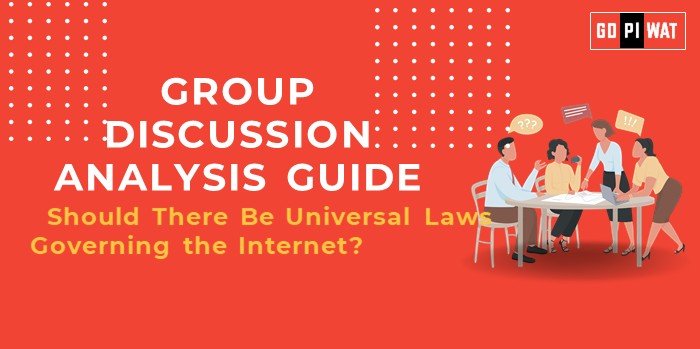📋 Group Discussion (GD) Analysis Guide: Should There Be Universal Laws Governing the Internet?
🌐 Introduction to the Topic
- 💬 Opening Context: The internet connects over 5 billion users globally, transcending borders and facilitating innovation. However, issues like cybersecurity threats, data privacy violations, and misinformation have raised calls for universal governance.
- 📜 Topic Background: Since its inception, the internet has evolved with minimal regulation. Efforts like the Budapest Convention on Cybercrime highlight the potential for global norms, yet enforcement remains fragmented.
📊 Quick Facts and Key Statistics
- 🌍 Global Internet Users: 5.3 billion (ITU, 2023) – Representing over 66% of the global population.
- 💸 Cybercrime Costs: Estimated to reach $10.5 trillion annually by 2025 (Cybersecurity Ventures).
- 🔐 Data Breaches: 22 billion records exposed in 2023 (IBM Security).
- 📜 Global Legislation: Over 128 countries have data protection laws, but with varying standards.
🔍 Stakeholders and Their Roles
- 🏛️ Governments: Craft laws addressing cybercrime, privacy, and misinformation.
- 🏢 Private Companies: Implement ethical practices in data handling and cybersecurity.
- 🌐 International Organizations: Facilitate treaties, such as the UN’s ICT policies.
- 👥 Civil Society: Advocate for user rights and transparent policies.
🏆 Achievements and Challenges
Achievements:
- 🔒 Cybercrime Reduction Models: Estonia’s e-governance reduced phishing by 45%.
- 🤝 International Collaboration: The Budapest Convention aligns 67 countries against cybercrime.
- 📚 Digital Literacy Campaigns: India’s PMGDISHA trained 6.7 crore citizens.
Challenges:
- 📜 Legislative Fragmentation: Diverse national laws hinder uniform enforcement.
- 🌐 Sovereignty Concerns: Countries like China and Russia resist global norms.
- ⚠️ Cybersecurity Risks: Major attacks, such as the 2022 AIIMS ransomware case, highlight vulnerabilities.
Global Comparisons:
- 🇪🇪 Estonia: A global leader in internet governance with strong e-residency and cybersecurity frameworks.
- 🇪🇺 EU GDPR: Sets a gold standard in data protection but lacks universal adoption.
Case Studies:
- 🛡️ AIIMS Cyberattack (India): Highlighted gaps in infrastructure security, causing prolonged system outages.
🎯 Structured Arguments for Discussion
- ✅ Supporting Stance: “Universal laws ensure equitable enforcement against cybercrime and protect privacy rights worldwide.”
- ⚖️ Opposing Stance: “Differing cultural, political, and economic contexts make global regulation impractical and inequitable.”
- 🤝 Balanced Perspective: “While universal laws are ideal for standardization, implementation should respect national sovereignty.”
🗣️ Effective Discussion Approaches
- 📜 Opening Approaches:
- “Cybercrime costs will reach $10.5 trillion annually by 2025—universal governance is essential.”
- “The Budapest Convention serves as a successful collaborative model for tackling cybercrime.”
- 🔄 Counter-Argument Handling:
- “Universal laws can respect sovereignty through phased implementation and tailored frameworks.”
- “Global cooperation has previously reduced cross-border crimes effectively—this approach can work for internet laws too.”
🔍 Strategic Analysis of Strengths and Weaknesses
- 💪 Strengths: Facilitates international collaboration, enhances cybersecurity.
- 🔧 Weaknesses: Potential clashes with local laws, risk of inadequate enforcement mechanisms.
- 🌟 Opportunities: Drive innovation in global tech standards, improve trust in digital ecosystems.
- ⚠️ Threats: Cyber espionage risks during collaboration, resistance from powerful stakeholders.
💼 Connecting with B-School Applications
Real-World Applications: Policy development for global technology firms, research projects on cybersecurity frameworks.
Sample Interview Questions:
- 💡 “Do you think universal internet laws could impede innovation?”
- 💡 “How can countries balance sovereignty with global digital cooperation?”
Insights for B-School Students:
- Understand the complexities of regulatory frameworks.
- Explore technological implications for emerging economies.


